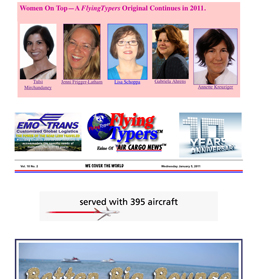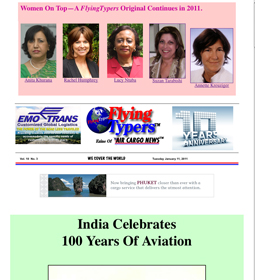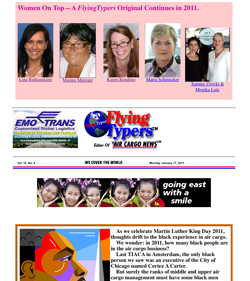 |
 |
|
| |
||
| Vol. 10 No. 5 WE COVER THE WORLD Wednesday January 19, 2011 |
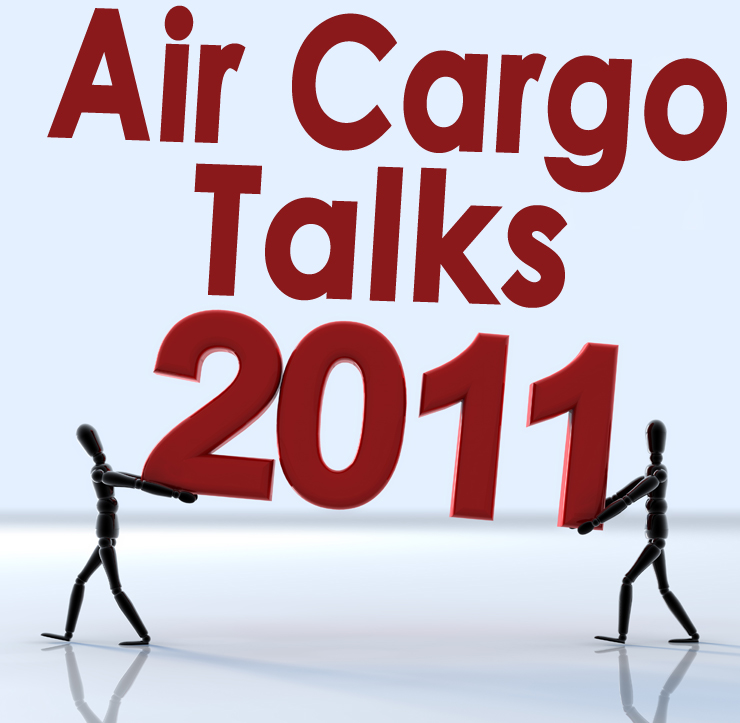 The path ahead certainly includes some reference to the road recently travelled. For air cargo, an exact projection of what will happen in the year ahead after having spent the past trio of years aboard a global economic rollercoaster might be considered risky business. But in the end, life and how we conduct our business are still part inspiration and part perspiration, although our survey seems to be finding much more affirmative voices on the doorstep of 2011. |
|
| |
Cargoitalia
MXP-ATL
|
|
| |
FT:
Has the financial crisis affected your business, and if so, how have
you modified the way you do business during the crisis? What actions
have you taken toward additional product enhancement and what new
products and services are or will be offered?
RH: We
were affected by the financial crisis in the same way the whole industry
was affected. Being an extremley lean organization we were well prepared!
We implemented and kept a strict cost optimization program and hence
we where able to get through the crisis very well.
The traditional ad-hoc charter business
will stay the main focus for the future. However, we started to look
into new segments, like small charter operation, as well as into year
round charter chains. Additionally we are discussing new products
and industry approaches together with Lufthansa Cargo and the Lufthansa
Cargo Group.
FT:
What is the most common misunderstanding about Lufthansa Cargo Charter?
RH: Everybody
thinks that we focus on selling group capacity only. That is not the
case at all; group capacity reflects only a minor share within our
business model.
We are also often seen as MD11 F, Boeing
744F and 777F provider, flying mainly in and out of Germany. However,
we do much more and can offer each size of aircraft from XXS to XXL
and that worldwide, be it between China and India or the US and Brazil
or any other country in the world.
FT: Has
anything in the air cargo businesses' recent past surprised you? If
there were one thing you could change about the industry to make it
better, what would it be?
RH: I
was surprised that 2010 was developing the way it did. The short recovery
mode from the crisis to what was, e.g. for our parent company the
best year in history, was a big surprise.
I would like to make our business more
predictable and reliable and less dependent on seasonality.
FT: How
has increased security demand impacted your business? In your opinion,
what contributed to the success of 100% security in the USA? Do you
believe that the same success will occur in Europe and elsewhere in
the world?
RH: We
are in line with the industry. We did not feel a negative development
due to increased security. Security will be the key in the future.
FT: Are
air cargo industry shows worth the cost, time and labor? What do they
deliver and what can be done to make them better? What air cargo conferences
do you plan to attend during 2011?
How productive have air cargo conferences 2010 been - i.e., Brazil
and CNS that you attended?
RH: To
improve the quality of conferences there must be more focus on current,
important topics. For example the issue that Dr. Otto brought up during
his speech at CNS about CNS becoming more international and bringing
the conference outside the U.S., and the follow up discussions that
are now continuing in FT.
This year we of course plan to attend
the transport logistic exhibition in MUC which is, in my opinion,
still the most important one. This will be a combined Lufthansa group
stand with LH Cargo, LH Cargo Charter, Swiss WorldCargo, Brussels
Cargo, time-matters and Jade. Besides we will be present at Air Cargo
Africa, a first time event, together with our colleagues from Brussels
Airlines Cargo. Brussels is very well established in the African market
and we hope to get a piece of the cake. At Intermodal in Sao Paulo
we will be with our colleagues from Lufthansa Cargo Brasil again and
for sure we will be at the CNS. Other conferences and exhibitions
will be visited by our local colleagues.
The Brazil show was an excellent experience.
It showed how big the potential is in the South American market. Everybody
is focused on China and India, however in my opinion the South American
market is emerging as an important market.. SA-EU, SA-Asia, SA-US
as well as the traffic within SA will grow and will play an important
role in the future.
FT: How
important to your business are air cargo industry awards?
RH: I
belive we could do with far less awards. With every publication giving
out awards nowadays we have a bunch of Best whatever in the end. Wouldn't
it be more serious to have one central award with different categories,
based on performance only.
FT: Earlier
last year, Lufthansa Cargo Charter (as did many other cargo companies)
was involved in lifting relief supplies to Haiti. What other moves
has Lufthansa Charter made to help organizations that are recognized
for their contributions to people in need? How much emphasis can you
place in utilizing Lufthansa Charter to help others?
RH: 2010
we also flew relief charters to Pakistan after the flood. Besides
we are a supporting member of the "Luftfahrt ohne Grenzen"(
Wings of Help ) institution. In this regard, we also sponsored their
Sikorsky S38 World Children's flight.
Relief is an important topic for us
which we do take very serious. We try to help whenever we can. Needless
to say, we provide relief flights at base cost.
FT:
When not working, what else interests you? Hobbies?
RH: I
like running and biking; in general I like spending my time outside
enjoying nature.
FT: At
some point in life, everyone thinks about the job they delivered:
How do you rate yourself? Why? Of what are you most proud?
RH: I
think together with my new team I have done quite a good job so far.
However it is far too early to relax - there is still a lot to do.
I'm proud that most of my people understand the new philosophy and
the new approach.
Geoffrey/Flossie
|
If
You Missed Any Of The Previous 3 Issues Of FlyingTypers |
|||||
|
|||||
FT010511 |
FT011711 |
||||

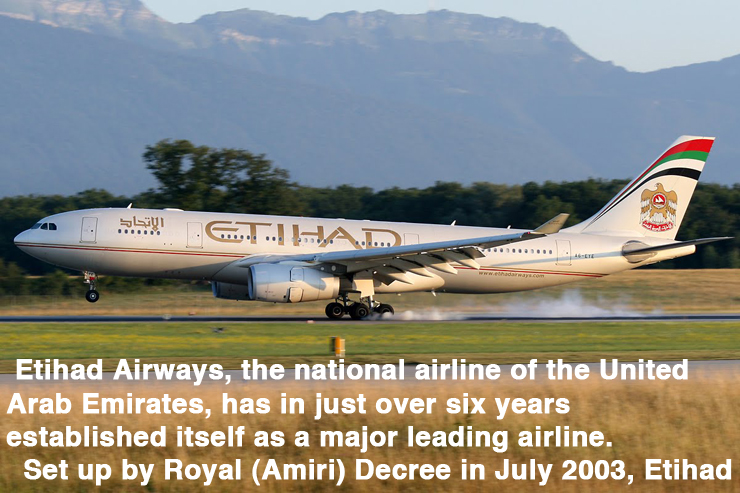
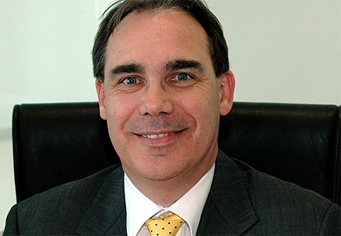 Roy
Kinnear
Roy
Kinnear 
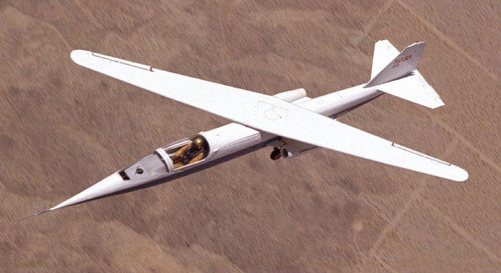

 Neel
Shah
Neel
Shah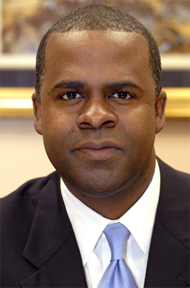
 Milan,
Italy-based Cargoitalia will begin scheduled service to Atlanta on February
3.
Milan,
Italy-based Cargoitalia will begin scheduled service to Atlanta on February
3.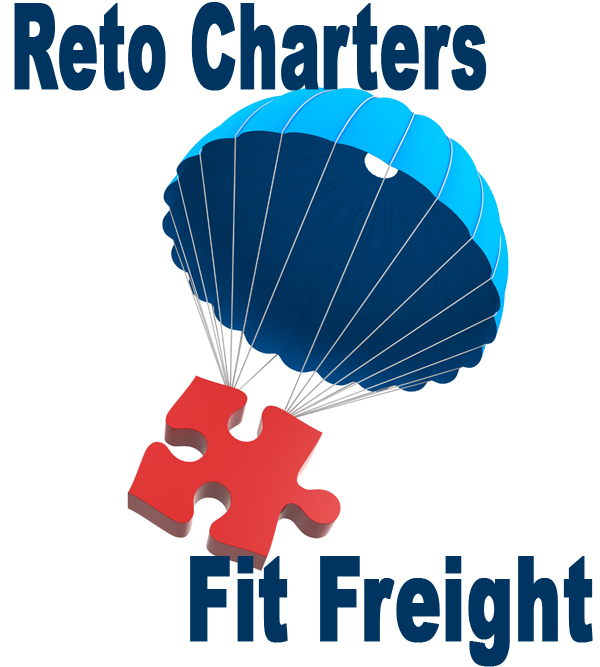
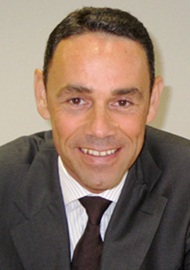 Reto
Hunziker, the likeable young manager of Lufthansa Charter, now has
completed his first year leading the organization, having taken the
MD reins from company founder Christian Fink early in 2010.
Reto
Hunziker, the likeable young manager of Lufthansa Charter, now has
completed his first year leading the organization, having taken the
MD reins from company founder Christian Fink early in 2010.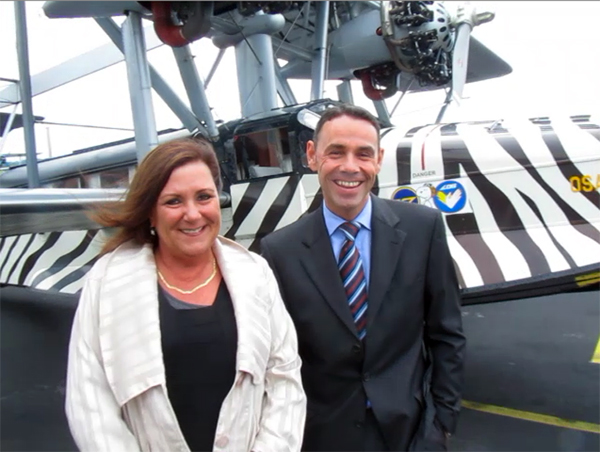
 RE:
RE:
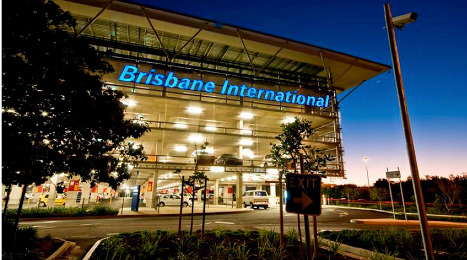 Late
News: The Brisbane City Council says
bad weather combined with a king tide this weekend could cause flooding
in areas that were not affected by last week's Brisbane River peak.
Late
News: The Brisbane City Council says
bad weather combined with a king tide this weekend could cause flooding
in areas that were not affected by last week's Brisbane River peak.